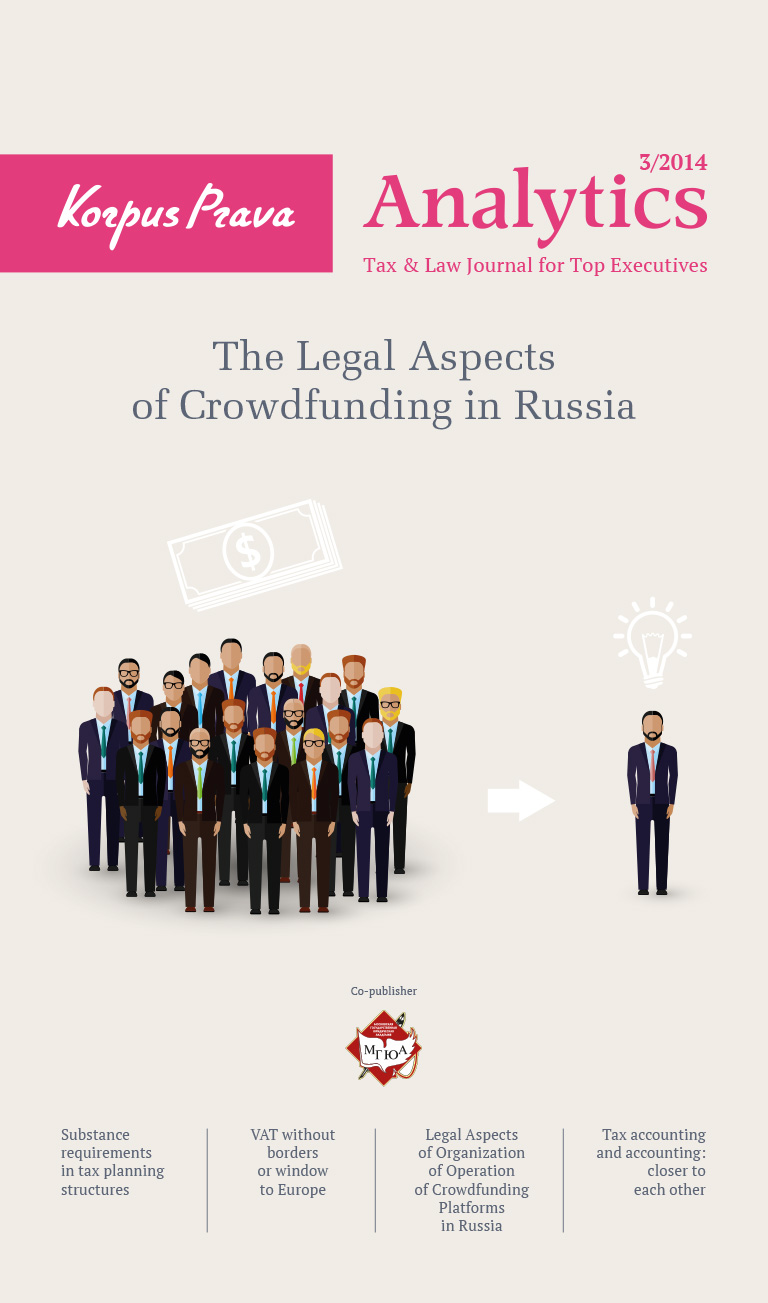- Cyprus Citizenship Scheme for Foreign Investors
- Squeezed But Pleased: Taxation of Passive Income in the European Union
- VAT Without Borders or Window to Europe
- Legal Aspects of Organization of Operation of Crowdfunding Platforms in Russia
- Substance Requirements in Tax Planning Structures
- “Deposit Splitting” of Individuals. Legal Civil and Criminal Aspects
Pressing Issues of CFC Profit Calculation
In view of rather short-term experience in calculation of controlled foreign companies (CFCs) profit for accounting purposes in the tax base of the controlling person, taxpayers often find it difficult to apply the rules of Chapter 25 of the Tax Code of the Russian Federation.
This article describes some of the most frequent and pressing issues raised by a taxpaying controlling person, when calculating the profits of a controlled foreign company.
First of all a taxpayer needs to determine the list of controlled foreign companies the profits of which are taken into account when determining its tax base. That is, it should check the participation criteria specified in article 25.13 and make sure that the CFC profit does not fall under the exemption from taxation in the Russian Federation, listed in article 25.13-1 of the Tax Code of the Russian Federation.
It must be remembered that the CFC tax base is determined separately for each foreign company.
The next important step is to determine the method that the controlling person will use to calculate the CFC profit.
Choosing a method for calculating the profit of a controlled foreign company
According to article 309.1, taxpayers have the opportunity to choose one of two methods for calculating CFC profit:

The calculation according to the rules of Chapter 25 of the Tax Code of the Russian Federation assumes:
- full accounting of all income and expenses of the company on the basis of primary documents according to the rules of Russian tax accounting;
- application of this method by the taxpayer for at least five tax periods.
If a company has the obligation to prepare financial statements and conduct an audit in accordance with the personal law of the country of incorporation, the choice is obvious. But sometimes the controlling person should think about the possibility of preparing audited financial statements, even when the company does not have such an obligation in accordance with personal law (for example, when the controlling person has sufficient reasons to consider the activity of a foreign company as vigorous).
Moreover, choosing the option of calculation according to the financial statements, do not forget that the profit that the controlling person needs to include in his tax base does not always coincide with the amount of profit indicated in the statements. The provisions of Article 309.1 of the Tax Code require a number of adjustments, in particular, to adjust the financial result of a foreign company to:
- amounts of revaluation or impairment of participatory interests in the authorized capital of an organization, securities, financial derivatives at fair value;
- amount of expenses for the creation of reserves and income from the recovery of reserves;
- amount of income from the sale of securities in favor of the controlling person and the cost of such securities, and so on.
The definition of the calculation period when the fiscal year of the CFC does not coincide with the calendar year
This question does not lose its relevance from year to year.
The norms of the Tax Code regarding controlled foreign companies are applied to CFC profit, determined from periods starting in 2015. Thus, the beginning of the period for which the CFC financial statements are prepared should be no earlier than January 1, 2015. If the financial statements are prepared by the company, for example, on September 30 of each year, then the period from October 1, 2014 to September 30, 2015 is not taken into account when determining the profit of the CFC.
At the same time, the date of receipt of income in the form of CFC profit is recognized on December 31 of the calendar year following the year on which the end date of the period for the preparation of financial statements is fallen.
That is, the date of recognition of profit according to the financial statements for the period from April 1, 2017 to March 31, 2018 is December 31, 2018 (if no decision was made to pay dividends before this date). Accordingly, it will be taken into account by the controlling person in the tax period ending December 31, 2019, and the taxpayer must report on it in spring of 2020.
The same principle applies when a controlling person acquires a stake in a foreign company or ceases to participate in it due to a sale or liquidation.
Example: The Seller (controlling person 1) sold the share of the controlled foreign company in the amount of 100% to the Buyer (controlling person 2) on November 15, 2018. CFC financial statements are compiled for the year coinciding with the calendar one. Since in respect of the fiscal year 2017, the share of the controlling person is determined as of December 31, 2018, on that date the Seller (controlling person 1) should not recognize the CFC profit for 2017 in its income. The Buyer (controlling person 2), on the contrary, will report on the CFC profit for 2017 in spring of 2019 and include it in its tax base for 2018.
Some taxpayers, who determine the method of CFC profit calculation for new companies for the first time, start from the period of recognition of the profits of a controlled foreign company in their tax base. The fact is that International Financial Reporting Standards (IFRS) allow preparing the first financial statements for a period not exceeding 18 months. For example, the company was established in August 2016. The calculation according to the rules of Chapter 25 of the Tax Code should be made for the period from the date of incorporation until December 31, 2016 (the last day of the calendar year) and is included in the taxpayer’s income for 2017, according to which it reports in spring of 2018. But the financial statements under IFRS and the audit report for such a company can be prepared for the period from August 2016 to December 31, 2017. Thus, choosing the method of calculation according to the financial statements, the taxpayer postpones the deadline for the inclusion of CFC profit in its tax base to the next year. This approach is contrary to the provisions of the Tax Code and carries certain tax risks for the controlling person, since International Financial Reporting Standards are not a personal law of a foreign company. Tax authorities may recognize the choice of such a method to be unreasonable, and, accordingly, impose a penalty for late notification.
Conversion of profit of a controlled foreign company into rubles
According to clause 2 of article 309.1, the financial result of a controlled foreign company determined according to the financial statements and expressed in foreign currency is subject to recalculation into rubles using the average exchange rate of the foreign currency to the ruble established by the Central Bank of the Russian Federation. At the same time, the Tax Code does not establish the method of calculation of the average rate. The answer to this question was published in two letters of the Ministry of Finance: No. 03-12-11 / 2/7395 of February 10, 2017 and No. 03-04-05 / 68013 of September 24, 2018. The average value of the foreign currency exchange rate to the ruble is determined by the taxpayer independently as the arithmetic average value of the foreign currency exchange rate to the ruble for all days of the financial year for which the statements are made.

The situation is more interesting when the controlling person calculates CFC profit according to the rules of Chapter 25 of the Tax Code. Recalculation into rubles can be carried out separately for each business transaction as of the date of recognition of the corresponding income / expense. And this option is considered to be inconvenient. The formation of the financial result in the currency of the permanent location of the controlled foreign company and the use of the average rate by analogy with the recalculation of the CFC profit according to the financial statements, will allow avoiding the negative effects of parallel accounting of all business transactions in rubles.
CFC profit reduction by dividend amount
The profit of a controlled foreign company is taken into account when determining the tax base for the tax period provided that its value exceeds 10,000,000 rubles.
An important task for the taxpayer is to determine exact amount of profit to be considered for comparison purposes with the specified limit.
Indeed, in accordance with clause 1 of Article 25.15, the CFC profit is reduced by the amount of dividends paid by this foreign company in the calendar year following the year for which financial statements are prepared in accordance with the personal law of such a company.
This brings up the question – if the CFC profit amounted to 15,000,000 rubles, but dividends were paid in the amount of 6,000,000 rubles, whether the criterion was met, and the profit of the foreign company was not included in the tax base of the controlling person.
In its letter No. 03-12-11 / 2/7395 dated February 10, 2017, the Ministry of Finance published an explanation “On the accounting of dividends paid when determining the profit of a controlled foreign company for the purpose of applying the criteria established by paragraph 7 of Article 25.15 of the Code”. According to the Ministry of Finance of Russia, the threshold values apply to the profit of a controlled foreign company, determined without considering its reduction by the amount of dividends paid by such a foreign company and the profit of a foreign company is reduced by the amount of dividends, in order to calculate the tax base rather than to compare with threshold values.
To this end, it is worth noting that the legislation as related to controlled foreign companies is supplemented and improved on ongoing basis. The last changes of Chapter 25 of the Tax Code came into force in 2019. More likely, additional explanations from the Ministry of Finance will appear, because the practice as to controlled companies is in its infancy in Russia.
Your subscription to our journal will definitely boost the efficiency of your specialists and downsize your expenses for consultants.
The journal is available free of charge in the electronic version.
Free Download

